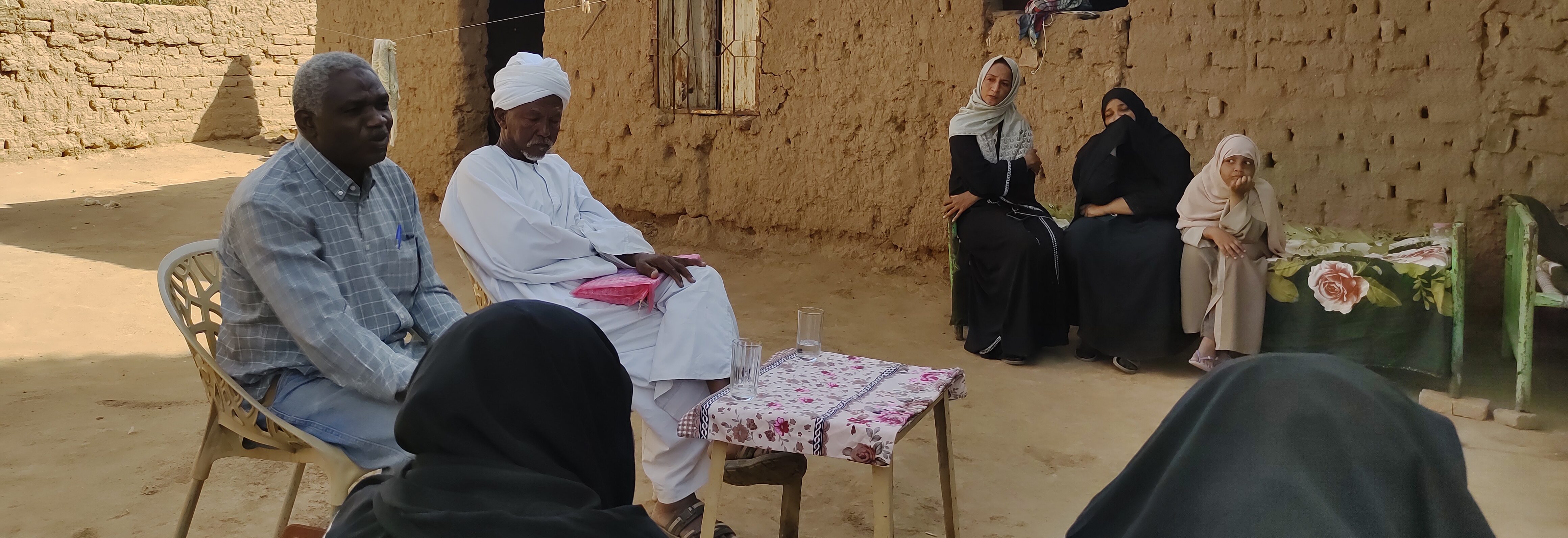
One year has passed since the conflict in Sudan erupted in April 2023, leaving a trail of displacement and hunger.
The international response has sadly been insufficient, leaving the Sudanese people to carry the burden largely on their own.
The ongoing conflict has led to a displacement crisis, with millions of people forced to flee their homes. Over eight million individuals have been displaced, and more than 1.4 million are seeking shelter in neighbouring countries, such as Chad and Egypt.
This has put an immense strain on already-limited resources and infrastructure, leaving around half of Sudan’s 47m people , in need of urgent humanitarian assistance according to the UN refugee agency (UNHCR).
The situation is dire, and the challenges faced by both the displaced population and those living in conflict-affected areas are significant. Amidst these challenges, Practical Action has remained committed to empowering the Sudanese communities and delivering climate solutions that improve lives and build resilience.
Here is a closer look at how Practical Action is delivering hope and assistance in Sudan one year on.
Addressing the Interconnected Challenges in Sudan
Recognising the link between conflict, climate change, and the displacement crisis in Sudan, Practical Action’s approach is centred in sustainable development and peacebuilding.
Akinyi Walendar, Practical Action Africa Director, said “The longstanding conflict in Sudan and its impact on the livelihoods of its people has led to the displacement of people, deforestation, and the loss of farming skills and knowledge.
“A contributing factor of this conflict has been climate change, as people who have lived side by side have clashed over diminishing resources.
“It is a vicious cycle leaving people struggling to produce enough food to sustain themselves.”
To tackle these interconnected challenges, Practical Action has developed innovative programs. Working directly with local communities, we have implemented climate smart agriculture projects that promote self-sufficiency, food security, and peacebuilding initiatives. Additionally, access to water and other essential services are being prioritised to support displaced populations.
Sustainable Agriculture for Food Security and Peacebuilding
Through our projects implemented in North Darfur, substantial progress has been made in helping thousands of farmers adapt to climate change and improve their livelihoods. Thanks to a successful appeal that raised £3.15 million, farmers in 19 communities in North Darfur are now benefitting from improved water storage and training initiatives.
Practical Action has utilised networks it helped establish decades ago to build peace between farmers and pastoralists, improve access to water resources, replant and protect pastureland, plant trees, and teach climate-smart agriculture and new ways of earning money. The result is an enhanced resilience for over 150,000 people in the region.
Sudan has a long history of conflicts and food insecurity, exacerbated by climate change. However, our efforts have brought positive change, directly improving the lives of nearly 36,000 individuals, and empowering an additional 120,000 people to enhance their livelihoods through capacity-building initiatives.
Significant achievements include the construction of the Malih Dam in Korga Nornga village, providing water for livestock and irrigation. Additionally, the establishment of home gardens and local production of essential resources, such as leather and dairy, are contributing to sustainable food production. The distribution of pasture seeds and fire breaks has afforded pastoralists with designated spaces for grazing, helping to foster peace and reduce conflict.
To ensure transparency and community support, Practical Action has held meetings with stakeholders and established farmer field schools for real-time learning. Hand-pumps and water reservoirs have been constructed to provide access to water along migratory routes, enabling both humans and animals to thrive.
The impact on the ground has been transformative. Farmers have tripled their production of sorghum and millet, increasing their income and food security. We continue to receive positive, appreciative feedback from community members who are experiencing the benefits of these interventions firsthand.
The Building Climate & Conflict Resilient Livelihoods for Rural Communities project, funded by UK Aid Match, along with the Wadi El Ku (phase two project) funded by UNEP, are our key interventions that continues to transform lives in North Darfur, thanks to the generous support of our donors.
Energy Solutions for Improved Livelihood and Resilience
Practical Action has also focused on initiatives that address energy poverty and help communities become self-sufficient. Sudan’s hot, dry climate can leave farmers struggling to irrigate their crops once seasonal rains end. We introduced solar-powered irrigation systems to help overcome the challenge of water scarcity and increase agricultural productivity. This innovative solution harnesses renewable energy to improve livelihoods and mitigate the impacts of climate change.
Collaborating with Communities for Resilience
Throughout its history, Practical Action has always placed great emphasis on collaborating with local communities to understand their specific needs, while answering their challenges in a way that is not only effective over the long-term, but also locally appropriate. Community leaders are consulted alongside traditional leaders to understand the real needs of the affected populations and ensure that all projects are inclusive and designed for sustainable results. This approach ensures a level of community ownership in our projects, and, in turn, creates a lasting impact.
Four new projects offer hope through climate action
In the face of the conflict and climate change, Practical Action’s successes and new projects continue to offer hope for Sudanese people in the regions where we work. The launch of our four transformative initiatives is bringing tangible solutions to improve livelihoods, food security, and income opportunities for thousands of smallholder farmers, Internally Displaced People, and host communities.
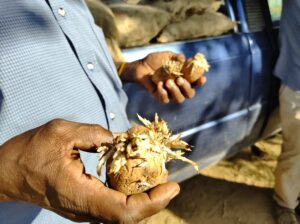
- The Sustainable Agrifood Systems Approach for Sudan
The Sustainable Agrifood Systems Approach for Sudan project seeks to improve the livelihoods of more than 7,000 farmers and enhance food security by promoting potato and sweet potato cultivation. By increasing the production and access to quality-assured seed varieties, adopting productivity-enhancing technologies, and building market systems, the project aims to empower farmers and enable them to generate better incomes.
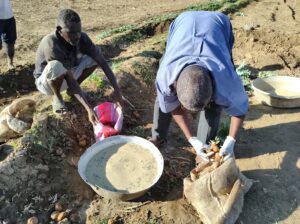
- Vegetables for Income, Nutrition, and Employment in Sudan
The Vegetables for Income, Nutrition, and Employment in Sudan project also focuses on improving the sustainability and profitability of popular local vegetable crops. It targets 6,000 farmers and provides learning opportunities and access to technologies that increase yields. To strengthen market systems, the project ensures the availability of quality-assured seeds, offers training on packing, and establishes drying units, cool storage, and aggregation centres. These interventions aim to improve product supply and create a more reliable market for the farmers.
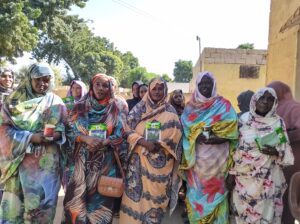
- Agribusiness in Eastern Sudan
The Agribusiness in Eastern Sudan project aims to make a positive impact on approximately 25,000 internally displaced people (IDP) and host communities, with a focus on supporting women and youth. The project mobilises investment from the private sector and social enterprises to support entrepreneurs and enhance farming practices. By doing so, it creates better choices for consumers and improved business opportunities for producers.
The goal of Agribusiness in Eastern Sudan is to enhance the self-sufficiency and economic participation of refugees and host communities, providing them with the means to improve their livelihoods and contribute to local economic growth.
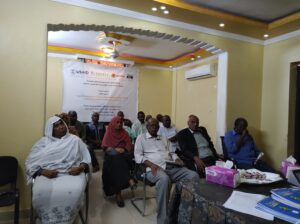
- Livestock-Food Systems Development (LFSD)
The Livestock-Food Systems Development (LFSD) project targets nearly 9,600 farmers. The early signs are promising. This project focuses on improving the livestock value chain, including dairy products, red meat, and poultry. The aim is to improve the sales and marketing of livestock, especially for export and processing.
This new project has the potential to make a big impact by increasing productivity in the dairy industry, improving milk supply, and boosting incomes. It also aims to strengthen resilience, food security, and livelihoods for the people involved.
As Sudan moves forward with this project, there is hope for positive change in the agriculture sector. This initiative shows our commitment to agriculture and livestock management. With ongoing dedication, the vision of a thriving and resilient livestock-food system in Sudan is becoming more attainable.
These four brand new projects offer hope in the face of conflict and climate change challenges. In Sudan, where livelihoods and food security are threatened, Practical Action’s initiatives provide practical solutions. By improving agricultural practices, introducing new crops, and strengthening market systems, these projects are empowering smallholder farmers, enhancing food security, and generating income opportunities.
Why our approach works in Sudan, despite conflict
Since starting our work in Sudan over 40 years ago, Practical Action has focused on strengthening local communities through their own organisations. We have helped several community groups become self-sufficient in implementing projects, managing finances, and accessing funding.
This approach has been successful even during times of conflict and scarcity because it ensures that community needs, and participation are at the heart of project implementation. By staying close to the community and prioritising their voices, we have been able to make a difference in Sudan’s development, showing the effectiveness of our approach despite challenging circumstances.
An urgent need for International Solidarity
The conflict in Sudan has had far-reaching consequences, demanding a collective response from the international community. Donor countries, humanitarian organisations, and regional bodies must unite their efforts to alleviate suffering and promote stability in the region.
Financial contributions are crucial to provide immediate relief and support long-term recovery efforts. These funds will help deliver essential aid, strengthen healthcare systems, and provide opportunities for education and livelihoods. Countries bordering Sudan should be supported in their efforts to manage the influx of refugees and provide adequate care and protection to those seeking shelter.
Diplomatic efforts are also pivotal in facilitating peaceful negotiations and consensus-building among the various parties involved. International actors must utilise their diplomatic influence to promote dialogues between conflicting factions, encourage political reforms, and foster an inclusive and participatory society.